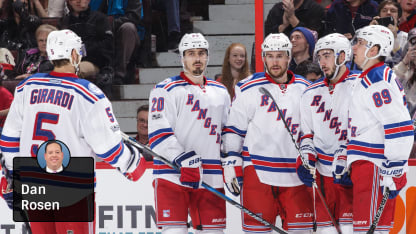GREENBURGH, N.Y. -- New York Rangers coach Alain Vigneault at various points this season has brought up the need to have four interchangeable lines, all with speed, skill and scoring, in order to win in the NHL, especially in the Stanley Cup Playoffs.
It looks like he found the four he was looking for in the Eastern Conference First Round against the Montreal Canadiens. They are four of the biggest reasons the Rangers feel confident about their chances of defeating the Ottawa Senators in the second round.
Rangers say scoring depth key against Senators
Four balanced forward lines make New York potent


© Jamie Sabau/Getty Images

















